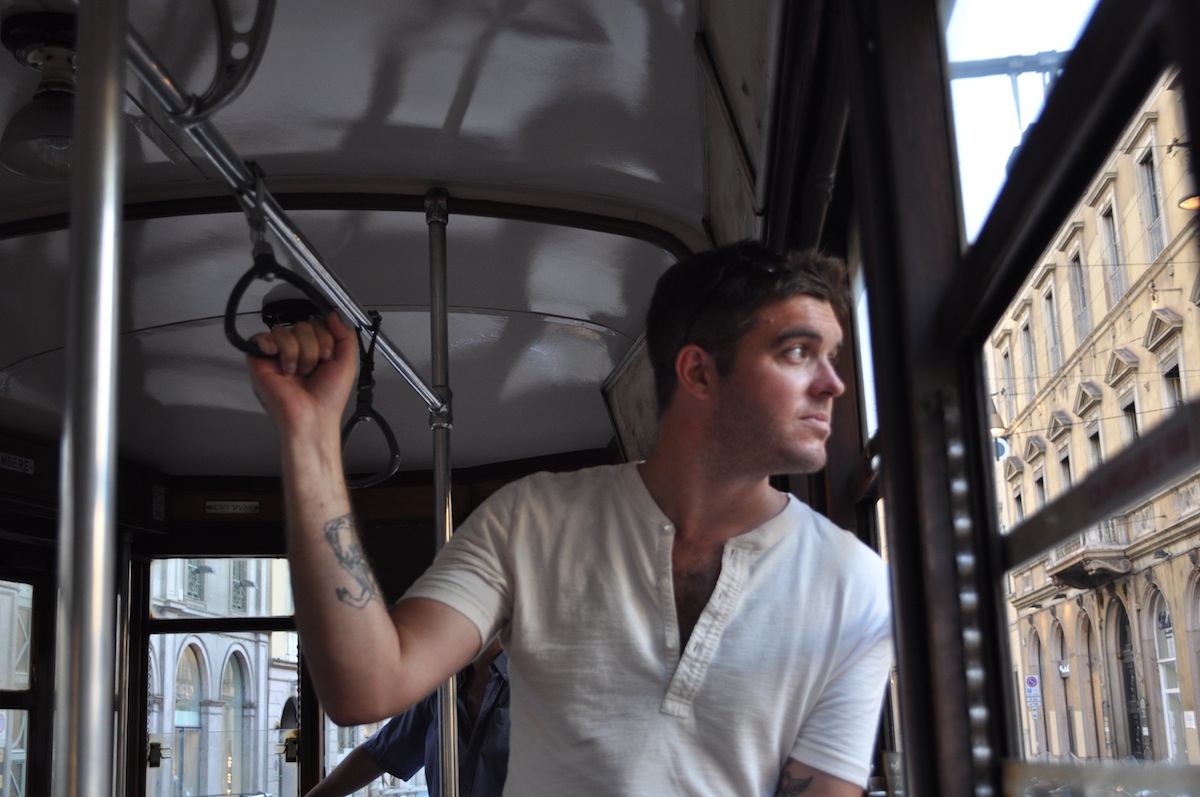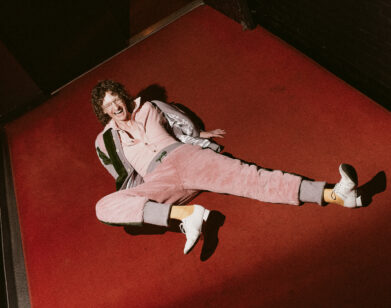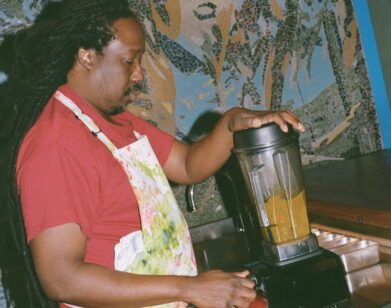Kevin Powers, In and Out of Conflict

ABOVE: KEVIN POWERS. PHOTO COURTESY OF KELLY POWERS
From 2004 to 2005, Kevin Powers served with the U.S. Army as a machine gunner in Tal Afar and Mosul, Iraq. In 2012, he published The Yellow Birds, a fictional account of his experience and an unflinching depiction of the reality of contemporary warfare. Powers’ lyrical, controlled prose traced the emotional and psychological impact of war with an intensity and sensitivity that earned the book a deservedly rapturous reception: it won the Guardian First Book Award, the PEN/Hemingway award, and was a finalist for the National Book Award in Fiction; Powers was compared to Norman Mailer, Tim O’Brien, and Enrich Maria Remarque, among others. At the heart of the novel is the relationship between the level-headed protagonist Private Bartle and his gentler, more childish fellow soldier Murph; the story of their friendship amounts to a condensed exploration of the limits of loyalty in conflict.
Powers’ new book of poetry, Letter Composed During a Lull in the Fighting, out this month, carries us across similar terrain, from the frontline to the home front: the rhythms of the soldier’s consciousness, the painful experience of waiting for the return of a loved one, and the profound difficulty of readjusting to life in the aftermath of combat. Readers will recognize The Yellow Birds‘ changing geographies, suggestive visuals, and musical language, which, with the shift to poetry, are invested with an immediacy that leaves the reader feeling awakened and humbled. We met with Powers at Artie’s on the Upper East Side, where we discussed the permeable boundary between poetry and prose, the randomness of memory, and the sense of danger that can accompany the act of writing, over coffee, cookies and—incongruently—rice pudding.
ALICE WHITWHAM: Why did you enlist?
KEVIN POWERS: The more I’m asked that, the less sure I am of the answer. I just didn’t know what I was going to do. I was 17, and I was a terrible student at school.
WHITWHAM: You didn’t know you were a writer?
POWERS: I didn’t know that I was allowed to be a writer. I thought of it as something other people were able to do. I knew that I liked writing, but that felt meaningless. We didn’t have a ton of money, and I certainly wasn’t going to get a scholarship of any kind. My high school sweetheart’s father was an army recruiter. We’re still in touch.
My dad had served in the army, and both my grandfathers had served in the Second World War. I was fairly idealistic at the time. The idea of service felt like a fair exchange: if I contribute something to my country, I’ll be given opportunities. There was something attractive to me about that life. I loved the outdoors, and I thought, this will be great, I’ll be in the woods with the guys, and we’ll train. This was before September 11, so the idea that it was ever actually going to lead to anything—it was a possibility, but I didn’t join during wartime.
WHITWHAM: You’ve said that one of the motivations behind writing The Yellow Birds was to address a question you were often asked: “What was it was like over there?” Was that also a motivation in writing these poems?
POWERS: I wrote a lot of them before I started the novel, and some of them while I was writing it. Poetry was the beginning of my thinking, a way of asking, Is this even an answerable question? How do I approach it? I wanted to be honest about both the experience and the difficulty of talking about it. In a lot of ways, the task at hand for any poem is to approach something that defies exactness or definition with a kind of exactness or precision.
WHITWHAM: Private Bartle, the protagonist of The Yellow Birds, appears in the title poem. Did “Letter Composed During a Lull in the Fighting” come before the novel?
POWERS: Yes, that poem was a kind of germ. I don’t know if I had told myself that I was writing a novel at that point. I had some prose that hadn’t cohered in any meaningful way. Later, I worked on poems just to give myself some space away from the novel—to shift into a new way of thinking about the material. I felt like I wanted to use whatever resources I had available to me to come to some kind of conclusion.
WHITWHAM: In “Great Plains,” you write: “When I say Nebraska / I mean the idea of, the way an ex-girlfriend of mine / once talked about the idea of a gun. But guns are not ideas. / They are not things to which comparisons are made. They are / one weight in my hand.” Does poetry allow you to engage with the reality of war’s violence more directly than prose?
POWERS: I think so. There’s something immediate about the experience of reading a poem. It makes sense in my own mind, but I’m trying to figure out a way to articulate it… It’s like looking at a painting: you’re able to take in the totality of the work all at once, and so processing whatever information that painting is giving you is almost secondary to simply apprehending what’s in front of you.
WHITWHAM: Which precedes understanding.
POWERS: Yes. Obviously it works on the level of comprehension, and it works on the level of words, and what they mean and what they’re trying to communicate. But there’s something immediate about the experience of reading a poem—whether it’s the music or some other element of it—that just seems to access another part of the brain. You know, Charles Olson talks about this transfer of energy that happens between the writer and the reader of the poem. I guess there’s something essential to me about acknowledging upfront the immensity of it—the difficulty of it—and even allowing that to be the subject. How do we define the language we’re going to use?
WHITWHAM: Why do you think most people are less inclined to read poetry than prose?
POWERS: I think it’s this idea that they have to decode it. That can be a really fascinating way of looking at a poem, but I don’t think it’s the only way. I’m always a little disappointed when I hear people say, “I don’t understand it.”
WHITWHAM: Was it hard to return to some of these experiences?
POWERS: Yeah, in some cases. I’ve always been pretty clear that I’m not the narrator of The Yellow Birds—and I’m not the “I” of these poems, either. But I think they do emerge more directly from my experience. Working on poems does require that kind of direct engagement. They do feel closer. There are times when I thought, you know, it’d be much healthier for me to be thinking about other things. But that’s probably not true.
WHITWHAM: What you’re saying makes me think of the title of your collection, Letter Composed During a Lull in the Fighting. I like the way it tells us that these poems are going to take us inside the soldier’s experience through this allusion to the private act of writing, a break in the momentum of combat.
POWERS: Writing that title poem was one of the rare times in my writing life where any part of the writing, whether it was a line or whatever, came very quickly. Almost as soon as I’d written it I had that sense of exactly what you’re describing: I wanted to allow there to be this space, this kind of pause, even though the rest of the poems weren’t there yet.
WHITWHAM: That sudden shift from a moment of quiet intimacy between the speaker and “the girl with red hair” to the sudden shock of violence—”the sound of each ignited shell”—in Independence Day reminded me of the kind of psychological extremes Yusef Komunyakaa evokes in his poetry about the Vietnam war. Can you say a bit about why he is meaningful to you?
POWERS: I think it begins with admiration for the work that he does. I’m able to return to him and always find something new and different. I’d read a lot of the major war poets in school. But he was one of the first poets writing about war who I discovered afterwards. It was important to me that here was a person trying to contend with this experience, and doing it in a way that was this powerful.
WHITWHAM: Which other poets writing about war have influenced you the most?
POWERS: Bruce Weigl, who writes about Vietnam. Some of Kenneth Koch’s stuff about World War II is really great. And there’s an Iraq poet named Brian Turner whose work I admire. I’ve also gone back to the poets of the First World War. You think of the body of work they’ve created, and then you think of the circumstances in which that work was created—it’s mind-boggling.
WHITWHAM: Let me ask you about geography. You move around a lot in the collection, from Iraq to small-town America to New York and the Bronx, so that the overall impression is disparate and shifting. Why did you want to create that effect?
POWERS: It’s trying to allow for multiple things to be happening at the same time—for the poems to be very narrowly focused on the interior experience, but also to have a sense of expansiveness. I’m always excited when I find this push-pull between the microscopic and the telescopic in what I read. I’m trying to evoke that clash of small and large scales, and the difficulties of locating oneself. I’m interested in, Where am I?
WHITWHAM: Your mother—or a mother—feels like an important presence throughout.
POWERS: You’re right that this isn’t necessarily my mother. But in a lot of ways, I was thinking about my own story. My mother resisted my going into the military. She was very strongly opposed to the wars in Iraq and Afghanistan. For me, it was one of the essential conflicts I felt I had to explore. You say, “Well, this person gave me life,” and I came very close to refusing that gift in a way, or I put myself in a position where I would both turn that gift away and take something from her at the same time. I remember she told me that she spent most of her free time that year watching the news, wondering if I was going to turn up on it. You think of the kind of torture that that must have been. And there was a time in my life where I just didn’t realize that. I knew—I sort of knew intellectually—that it was going to be hard. But I didn’t understand the gravity of it. I don’t have any children. So I’m trying to imagine myself into some kind of accountability, some way of atoning for that or acknowledging that. People tell soldiers, “I can never understand what you went through,” and I can never understand what she went through. How do I wrestle with that as another aspect of the experience of being a soldier or veteran?
WHITWHAM: “Blue Star Mother” builds toward that recognition of “how hard the waiting was” for her.
POWERS: That poem is an acknowledgement of a strength I wasn’t even aware of when I signed up: endurance. So many families have had to find out if they have that quality. It’s staggering to think about it—that parallel tier, that parallel war.
WHITWHAM: What did you want the poems to say about the soldier in the aftermath of war?
POWERS: I think there’s something about enduring the profound sense of isolation—whether it’s imagined or real—and facing that or wrestling with that and finding a way to tear down the wall, brick by brick, that’s surrounding you. And again, this is something that a lot of people deal with, not just the soldier returning home. For me it’s much easier to retreat into platitudes. It’s always easier, in the short term, to pretend like nothing’s wrong.
WHITWHAM: “Separation” really movingly illustrates that feeling of isolation. “Twenty-four and crying / for my rifle and the boys / at the end of the bar / were laughing.” It reminds me of the state of mind you evoke at the end of the previous poem: “You came home with nothing, and you still have most of it left.” How did you go about arranging the poems? Did you tend to write a poem in response to another?
POWERS: Perhaps organically rather than consciously. There are definitely connections between poems, but I wanted each to stand on its own. I guess it goes back to this idea of trying to zoom in and out, and to modulate, so there are different ways of looking at any experience for the reader. Even having short poems and long poems—there has to be some kind of variation in the experience of reading as a whole.
WHITWHAM: When Bartle comes back from the war in The Yellow Birds, he experiences flashbacks. The poems are concerned with remembering the experience of war but also forgetting it. In “Grace Note”: “The thing I can’t recall/was what I had been waiting for.” What do you see as being the relationship between the two?
POWERS: The easier thing would be to forget. So the challenge comes in the attempt to have some measure of control over something you may not ever actually be able to have any control over. The memories of your experiences, as you say, assert themselves unpredictably, and you both have to respond to them in the moment and figure out how to live knowing that this may be a condition that becomes constant. So there’s a desire for escape. But at some point you recognize that freedom from the experience comes from acceptance of the condition as it is rather than as you might want it to be. And for me, memory is such an important aspect of the experience. It’s so strange and unreliable.
WHITWHAM: Because so much of memory relies on imagination.
POWERS: Exactly. You’re constructing the material from which you’re supposed to make sense of your experience. I don’t even know if it can be defined—but let’s try, you know? Let’s talk about how hard it is to be bombarded by these memories, which have a tenuous relationship to reality, but which are so important for your ability to move forward.
WHITWHAM: “Improvised Explosive Device” has really stayed with me. “If this poem had wires coming out of it, / you would call the words devices.” It’s so unexpected—that parallel between writing poetry and a bomb exploding.
POWERS: With that poem in particular I was really interested in the consequences and the potential danger of revisiting the experience and trying to find a way to communicate the inevitable vulnerability of exposing yourself. There’s a feeling of danger. I don’t know.
WHITWHAM: A danger in writing?
POWERS: Yeah, or in being open about it, whatever shape that takes. The isolation is destructive but also a safe harbor so, when you get out of it, you’re exposed. I felt like presenting that conflict as analogous to the experience of actual combat might lead to something. I wanted to talk about how hard it is to acknowledge these words and what they’re attached to in the world and in my memory. That poem is important to me.
KEVIN POWERS’ COLLECTION LETTER COMPOSED DURING A LULL IN THE FIGHTING IS OUT TOMORROW, APRIL 1 (LITTLE, BROWN).






